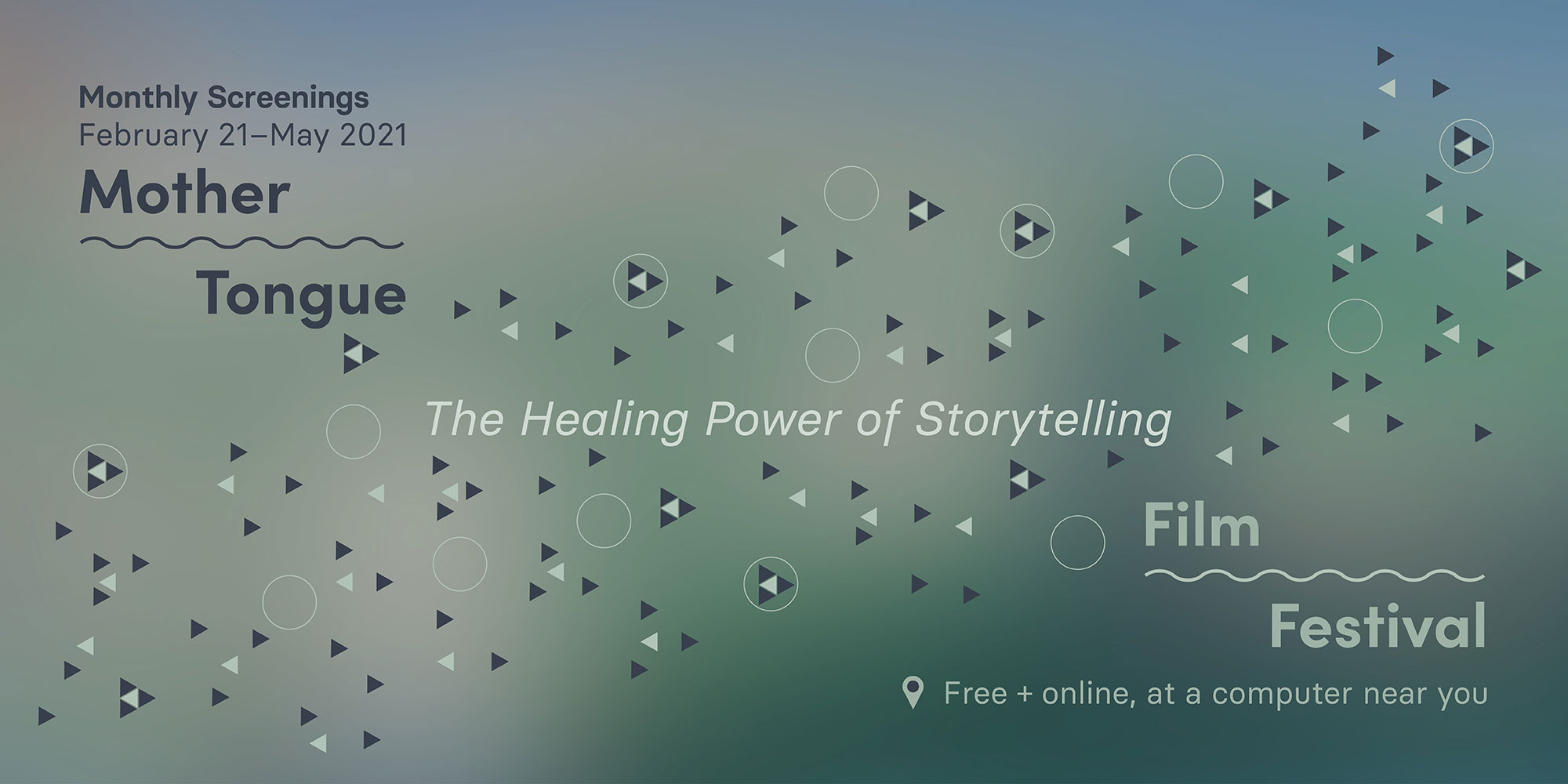

The sixth annual festival took place via a monthly online screening series from February 21 to May 31, 2021.
Films marked with are available to stream in full on our website after the festival has closed. Those with have Q&A videos available.
Sunday, February 21, at 6 pm ET
Following opening remarks from Smithsonian organizers, the festival’s first event features a talkback with Waikiki director Christopher Kahunahana, moderated by Kālewa Correa, curator of Hawai‘i and the Pacific at the Smithsonian Asian Pacific American Center. Waikiki, the festival’s opening film, will be available to U.S. audiences from February 21 to 27.
Sunday, February 21, at 6 pm ET
In conversation with festival co-director Amalia Córdova, filmmaker Sophie Pinheiro discusses the process and inspiration behind her experimental documentary Teko Haxy/Being Imperfect, available February 21 to March 31.
Thursday, February 25, at 6:30 pm ET
Co-presented with Columbia University School of the Arts
Accompanying the film Tote/Grandfather, writer and director Marίa Sojob joins Mother Tongue co-director Amalia Córdova and Emmy Award-winning filmmaker Sebastián Díaz in conversation. The discussion is introduced by Ron Gregg of Columbia University’s Film and Media Studies department.
Friday, March 5, at 2 pm ET
Women are often entrusted with cultural and language transmission, and we highlight this responsibility by bringing together women directors on a roundtable each year. Join us for a conversation with Becs Arahanga (Hinekura), Valeriya Golovina (Our Love), and Sophia Pinheiro and Patrícia Ferreira (Being Imperfect), moderated by festival co-director Amalia Córdova and curator and filmmaker Cass Gardiner.
Friday, March 19, at 2 pm ET
Join us for a roundtable discussion exploring the thirty-year collaboration between anthropologists and filmmakers Lina Fruzzetti (Brown University) and Ákos Östör (Wesleyan University), spanning numerous publications and six films. Moderated by Alice Apley (director, Documentary Education Resources) and joined by Pam Wintle (senior film archivist, Human Studies Film Archive), this roundtable will focus on Fruzzetti and Östör’s important body of work, and the trajectory and craft of their filmmaking and storytelling as anthropologists.
Friday, March 26, at 9 am ET
Co-sponsored by the Taiwan Academy, the Taiwan Ministry of Culture, and the Smithsonian’s National Museum of Asian Art
In conversation with National Museum of Asian Art film curator Tom Vick, filmmaker Su Hung-En will discuss his documentary The Mountain, available March 22 to April 4. Learn about the history of Taiwan’s Indigenous peoples’ recertification movement in this Q&A, focusing on creativity and cultural perseverance under the challenges of forced assimilation.
Friday, April 2, at 1 pm ET
Language reclamation, pressures on language from current and historical dislocation and forced relocations, and filmmaking for educational purposes are some of the through lines that will be explored in our education roundtable. Smithsonian curator Mary Linn will moderate the live discussion with Ruben Reyes, director of Garifuna in Peril; Kari Chew (Chickasaw), the project lead for Growing the Fire Within; and Putu Desy Apriliani, manager of the “scholars’ room” bookshelf in BASAbali, the organization involved with the development of Luh Ayu Manik Mas.
Monday, April 26, at noon ET
Soori, Hakim, Akbar, and Mohammed have a collective dream: to travel from Iran to their parents’ homeland of Afghanistan and play their first rock concert. Discussing their feature-length film The Forbidden Strings, director Hasan Noori and producer Afsaneh Salari explore the intricacies of production with the National Museum of Asian Art film curator, Tom Vick.
Friday, April 30, at 12 ET
In Haka Puai Te Kainga / Eating Up Easter, director Sergio Rapu speaks to the pressures the people of Rapa Nui (Easter Island) feel amid increased tourism and development. Rapu, alongside Smithsonian Asian Pacific American Center curator Kālewa Correa, will discuss the power of environmental storytelling explored in the film.
Friday, May 7, at 4 pm ET
A portrait of resilience, The Land of Eb encapsulates the barriers experienced by Marshallese communities displaced by nuclear weapon testing that has forever altered the islands they call home. Join us for an engaging conversation with the film’s director, Andrew Williamson, and lead actor Jonithen Jackson, moderated by festival co-director Joshua Bell.
Live on Friday, May 14, at 5 pm ET
Exploring our 2021 theme, the healing power of storytelling, this panel highlights the unique ability of film to project stories to places they might have never traveled before—bringing connection, understanding, and healing. Moderated by festival co-director Joshua Bell and Smithsonian Asian Pacific American Center curator Kālewa Correa, directors Christopher Auchter (The Mountain of Sgaana), Adrian Baker (Source of the Wound), Christopher Kahunahana (Waikiki), and Hinaleimoana Wong-Kalu (Kapaemahu) will discuss the role of storytelling in their films.
Premieres Friday, May 21, at noon ET
After being initiated as kahu oli, caretakers of Hawaiian chant, filmmakers Kris Kato and Keoni DeFranco recognized their responsibility to uphold their traditions while far from home in New York City. In conversation with Kris, Keoni, and the film’s director, Jacueline Hazen, festival co-director Joshua Bell will discuss the importance of holding space for our own cultural practices across geographical boundaries.
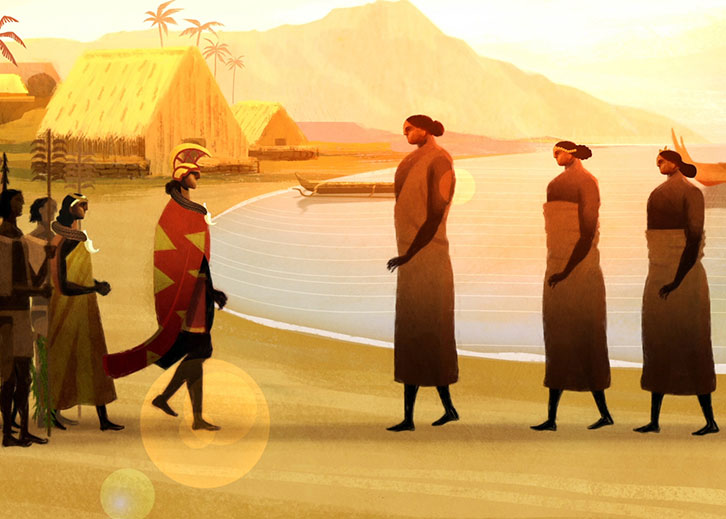
The 2021 Mother Tongue Film Festival’s animation playlist seeks to empower identification through language. Featuring twelve short animations created by Indigenous filmmakers, or created in collaboration with members of Indigenous communities and arts organizations, this playlist provides a variety of engaging stories sure to inspire those of all ages.
The Mother Tongue Film Festival is a public program of Recovering Voices, a collaboration between Smithsonian’s National Museum of Natural History, the National Museum of the American Indian, and the Center for Folklife and Cultural Heritage.
Additional Smithsonian partners include the Asian Pacific American Center and the Freer Gallery of Art and the Arthur M. Sackler Gallery—the Smithsonian’s National Museum of Asian Art. The program received federal support from the Smithsonian Asian Pacific Initiatives Pool, administered by the Smithsonian Asian Pacific American Center, and the Smithsonian American Women’s History Initiative.
This program received support from Bicentenario Perú 2021, Columbia University School of the Arts, Documentary Educational Resources, the Embassy of Canada to the United States, Ferring Pharmaceuticals, Mexican Cultural Institute of Washington, Taiwan Academy, Taiwan Ministry of Culture, the Embassy of New Zealand, the Hawai‘i International Film Festival, The Elizabeth and Whitney MacMillan Endowment, Wick and Bonnie Moorman, and more.
Christopher Kahunahana, Kanaka Maoli
Hawai‘i
English, 'ōlelo Hawai‘i
2019
83 min.
Narrative Feature
This film is no longer available.
Escaping her abusive ex-boyfriend, Kea, a part-time Hawaiian teacher, hula dancer, and bar hostess, temporarily lives out of her van to piece her life back together. One night after a violent beating, she speeds off into the night only to slam into a mysterious homeless man crossing the street. Unwilling to leave him to die, she takes him into her van and her life. Waikiki, Hawai‘i’s first Native-written and -directed feature, is a visceral allegory for the contemporary issues which plague Hawai‘i’s people, including mental illness, physical abuse, and identity loss.
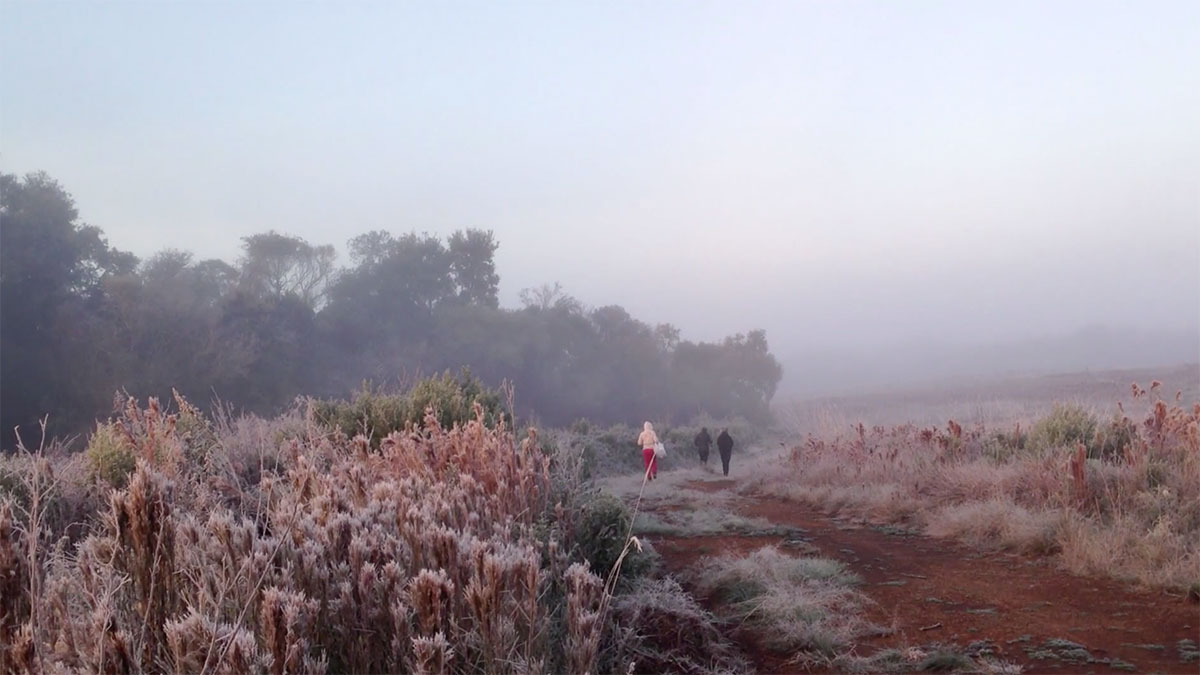
Patrícia Ferreira (Mbaya-Guaraní)
Sophia Pinheiro
Brazil
Guaraní, Portuguese
2018
40 min.
Documentary Featurette
In this experimental documentary, the personal relationship between two women—a Keretxu filmmaker and a Brazilian anthropologist—embodies the tensions of ethnographic and Indigenous filmmaking. The protagonists, each equipped with a camera, navigate the complexities of vulnerability, interpersonal relationships, and power dynamics as they film each other and their surroundings.
María Sojob (Tsotsil)
Mexico
Tzotzil, Spanish
2019
80 min.
Documentary Feature
This film is no longer available.
What is the meaning of love in Tzotzil? Tote is the debut documentary feature from Maria Sojob that explores questions of love, family, tradition, and marginalization. María seeks out her grandfather while he sits and weaves a traditional hat. Throughout the process, a complex portrait develops: contrasting the point of view of the younger generation with the traditional world, and we are revealed the meaning of love in Tzotzil.
Clara Calvet
Bolivia
Quechua
2015
57 min.
Documentary Feature
This film is no longer available.
Women weavers play an important role in the highland communities of Bolivia. Through their mastery of ancient textile traditions, often practiced while child-rearing, managing farms, and herding, these artisans tell stories, document daily life, and sustain their families. This is a story of women’s creativity told through conversations with twenty-two weavers who share their experiences, artistry, and lives.
Lina Fruzzetti
Ákos Östör
Italy, Eritrea, United States
Italian, Arabic, Tigrinya
2017
82 min.
Documentary Feature
This film is no longer available.
When she receives an email from a long-lost sister, Lina begins her journey to learn more about her Italian father and Eritrean mother. In an attempt to understand the history of her family, Lina travels to both Italy and Eritrea to speak with friends and relatives about their personal experiences, sharing a familial history affected by colonial rule, war, migration, and diaspora.
Su Hung-En
Taiwan
Mandarin, Truku
2015
61 min.
Documentary Feature
This film is no longer available.
The Truku people of Taiwan are an Indigenous population that have been forced to live under a variety of colonial rules for hundreds of years. With each regime, the Truku have fought to maintain their culture, even in the face of brutal processes of forced assimilation. Through footage and intimate interviews with a Truku elder, we can better understand the effect of colonization on Taiwan and the history of the aboriginal recertification movement.
Content warning: This film contains scenes of animal death that some viewers may find disturbing.
Alí Allié
Rubén Reyes
United States, Honduras
Garifuna, English, Spanish
2012
99 min.
Feature Docudrama
This film is no longer available.
In his home village in Honduras, Ricardo teaches new speakers of the Garifuna language. While Ricardo fights for the Indigenous land to build his school, his family back in Los Angeles faces their own coming-of-age struggles, framed through the story of their ancestors’ fight for freedom on the island of St. Vincent.
Óscar Catacora (Aymara)
Peru
Aymara
2017
86 min.
Dramatic Feature
This film is no longer available.
Willka and Phaxsi, an eldery couple living in a remote part of the Peruvian Andes, stand together and take on the challenges that each day presents, awaiting the return of their long-absent son. This beautifully shot and sometimes heart-wrenching story is the first Peruvian feature film to be made completely in the Aymara language.
Hasan Noori
Iran, Afghanistan, Qatar
Persian
2019
71 min.
Documentary Feature
This film is no longer available.
Soori, Hakim, Akbar, and Mohammed have a collective dream: to travel from Iran to their parents’ homeland of Afghanistan and perform at their first rock concert. Working as migrant laborers during the day, the group practices in a studio away from their families at night. Throughout their journey, the four young band members face the complicated nature of making politically minded music that reflects their lived reality as migrants from Afghanistan.
Sergio M. Rapu (Rapa Nui)
United States, Chile (Rapa Nui)
English, Spanish, Rapa Nui
2018
77 min.
Documentary Feature
This film is no longer available.
Rapa Nui filmmaker Sergio Rapu explores the negative effects of tourism on his home island. Crafted as a story to pass down to his newborn son, Rapu intertwines the history of the island with the stories of four islanders. In their own voices, they reveal the reality of modern life and the actions they are taking to preserve their culture and environment amid rapid development.
Andrew Williamson
Marshall Islands, Hawai‘i
Marshallese, English
2012
87 min.
Dramatic Feature
This film is no longer available.
Jacob Jackson has dedicated his life to supporting his family in Hawai‘i, especially after being displaced from his home in the Marshall Islands due to nuclear weapons testing. Jacob is notably resilient and continues to support his family even after being diagnosed with cancer. Despite facing hardships such as healthcare access and illiteracy, Jacob shows that he is a natural leader and father whose utmost priority is his family’s future in Hawai‘i.
Adrian Baker
United States
English
2019
6 min.
Animated Short
Through vivid animation, the nature of historical collective trauma in Indigenous communities is explained. While the impact of emotional trauma continues to move across generations, many communities are trying to actively combat these emotional wounds. By way of storytelling, dancing, and singing, communities are changing the narrative to define what it currently means to be Indigenous.
Prof. Ramona Beltrán explores historical trauma and healing in award-winning animated short film (Interdisciplinary Research Institute for the Study of (in)Equality)
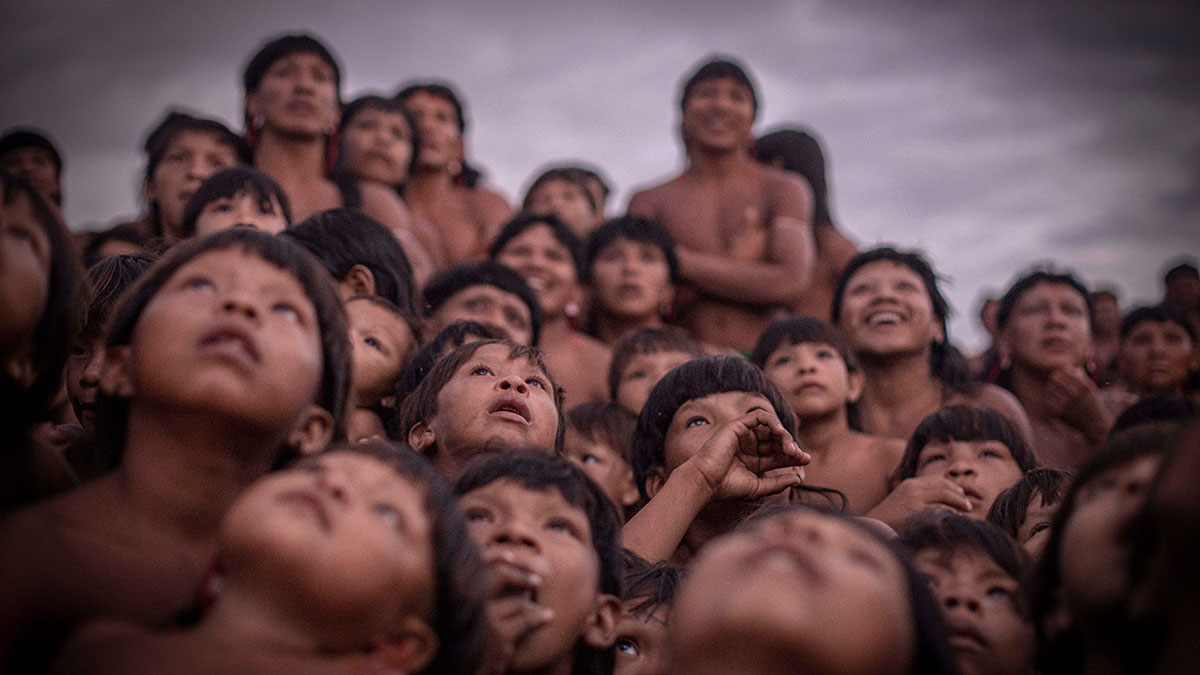
Vincent Carelli
Brazil
Portuguese, Enawenê-Nawê
2020
22 min.
Documentary Short
This film is no longer available.
In 1995, a team of filmmakers and anthropologists recorded ceremonies and daily life with the Enawenê-Nawê of the state of Mato Grosso, in central Brazil. Twenty-five years later, more than 300 hours of images of the Yaõkwá ritual, a seven-month festivity recognized as Intangible Heritage of Humanity by UNESCO, were cataloged and edited by the Vídeo nas Aldeias collective with the participation of the Enawenê-Nawê community. This film documents the arrival of these precious images back to the villages, reintroducing the history of the ceremony to a new generation.
Louder than Words with Vincent Carelli (Prince Claus Fund)
José Luis Matías (Nahua)
Mexico
Me’phaa, Spanish
2020
38 min.
Documentary Short
This film is no longer available.
In the Me’phaa community of Apetzuca, in the municipality of Acatepec, Guerrero, in southwestern Mexico, newly elected leaders receive their staffs of authority in a public ceremony, followed by a series of closed rituals. They are purified by smudging, drinking chile soup, fasting, and ceremonies guided by the spiritual authorities, elders who make offerings to help them carry out their responsibilities and lead well.
Juan Castrillón
Colombia
Pamie (Cubeo), Spanish
2019
36 min.
Documentary Short
This film is no longer available.
In the Northwest Amazon, a Cubeo Emi-Hehenewa community living along the Vaupés River in southern Colombia reassembles instruments and ritual practices that were prohibited by Catholic and Protestant missionaries during the mid-1950s. In an essayistic gesture, the film pieces together fragments of daily life shared by the director, an ethnomusicologist, and the community, in their common attempt to evoke the sound of kiraiñia, the long flutes.
Francisco Huichaqueo (Mapuche)
Chile
Tstotsil, Mapuzungun, Quechua, Spanish
2020
43 min.
Documentary Short
This film is no longer available.
Mapuche director Francisco Huichaqueo paints a collective portrait of five women united by spirituality and poetry. This filmic journey is told through the words of Indigenous women from different territories, joined by the sonority of their mother tongues, which forms a braid that bonds them forever.
Healing through curation: a conversation between three indigenous image curators in the Abya Yala movement (Senses of Cinema)
Mapuche Cosmovision and the Cinematic Voyage: An Interview with Filmmaker Francisco Huichaqueo Pérez (Media+Environment)
Brice Habeger
Alaska
Iñupiaq, English
2020
7 min.
Experimental Dramatic Short
A young Iñupiaq and Yupik woman from Alaska retells the true story of Ada Blackjack, who, after facing hardships in her personal life, pushed herself to join a harrowing 1921 expedition to the Arctic. She was the lone survivor. Mixing live action, animation, illustration, and archival photography, this short film reflects on the loneliness Ada must have felt and the strength she found to survive such harsh conditions.
Produced by Holly Mititquq Nordlum (Iñupiaq) and Paddy Eason, the team worked closely with an Alaska Native cast. The majority of the film is spoken in Iñupiaq by Nome resident and teacher Madelyn Alvanna-Stimpfle. The original music was composed by Chris David (Tlingit) of Juneau.
True story of survival in the Arctic (Indian Country Today)
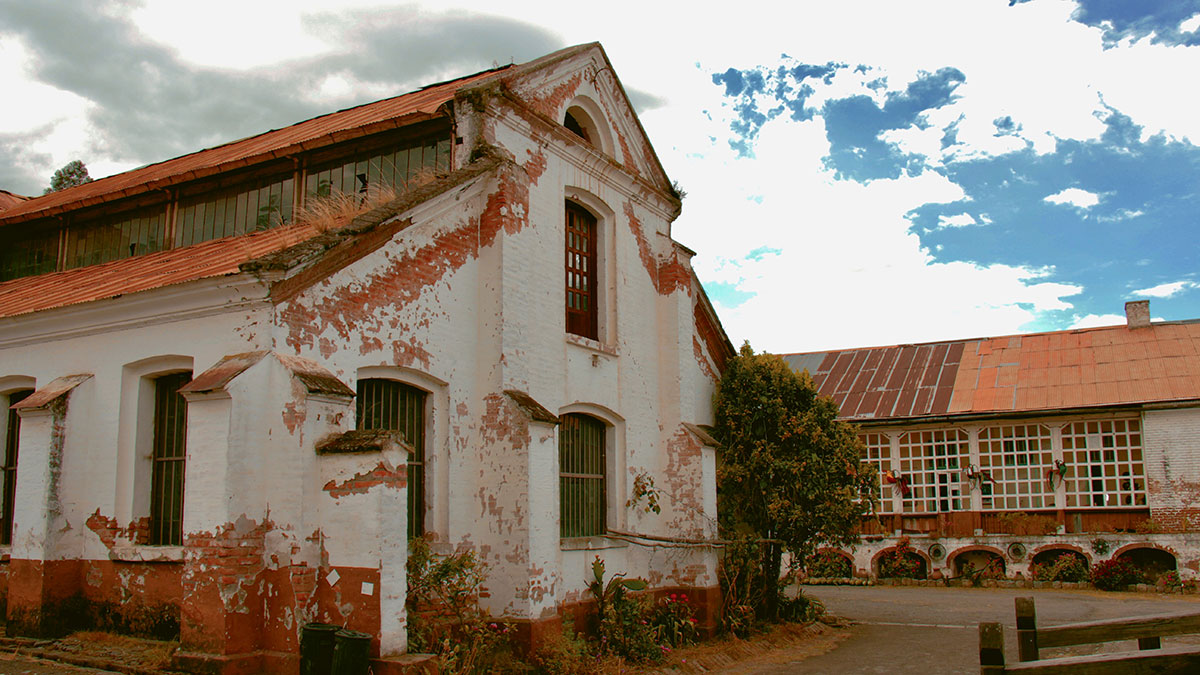
Alberto Muenala
Frida Muenala
Ecuador
Kichwa
2019
10 min.
Documentary Short
This film is no longer available.
No longer subjected to violence and exploitation, former workers of the San Pedro textile mill in highland Ecuador share their stories and path toward collective ownership of their factory—now transformed into a museum to celebrate their Kichwa language and culture.
Lina Fruzzetti
Ákos Östör
Aditi Nath Sarkar
India
Bengali
2005
40 min.
Documentary Short
This film is no longer available.
In response to a cultural crisis and in an attempt to make money for their families, a group of women in the village of Naya (West Bengal, India) decide to form a cooperative to learn and practice the craft of scroll-painting. The stories, which were traditionally religious in nature, have shifted in content due to competition from other forms of media. The women navigate their daily lives while transforming the art of painting and performing scrolls to include new themes: societal concerns, women’s issues, and world news.
Lina Fruzzetti
Ákos Östör
Steven Ross
Tanzania
Swahili
2001
38 min.
Documentary Short
This film is no longer available.
Although Dar es Salaam, Tanzania, is a metropolis of three million people, the city’s demand for fish is met entirely by the local fishing community, equipped with traditional methods and tools that have been used for hundreds of years. Over the course of a day, and eschewing commentary and voiceover explanation, this film opens with the daily activities of a small fishing community and tracks the movement of the fishermen to the central fish market and pier in the harbor, where hundreds of people make a living in the process.
Lina Fruzzetti
Alfred Guzzetti
Ned Johnston
Ákos Östör
India
Bengali
1995
36 min.
Documentary Short
This film is no longer available.
Following the everyday life of the families of two brothers who live side by side, Seed and Earth explores how gender and age determine work, ritual, and leisure activities in rural West Bengal.
Lina Fruzzetti
Alfred Guzzetti
Ákos Östör
Zanzibar
English
2000
25 min.
Documentary Short
This film is no longer available.
Khalfan Hamid Khalfan has dedicated much of his time to running the Association of the Disabled in Zanzibar, off the coast of Tanzania. Footage showing the lives of Zanzibar’s disabled population as well as the history and culture of Zanzibar, contextualizes Khalfan’s vital work within his community.
Lina Fruzzetti
Ákos Östör
Aditi Nath Sarkar
India
Bengali
2009
35 min.
Documentary Short
This film is no longer available.
Dukhashyam, a progressive artist and thinker, explores his vision of the decline and rebirth of his art through multiple lenses: his tolerant Sufi Muslim spirituality, his engagement with contemporary society, his knowledge of changing artistic histories and techniques, and his teachings for future generations of artists in his community.
Becs Arahanga (Kai Tahu, Ngati Raukawa)
New Zealand
Te Reo Māori
2019
18 min.
Dramatic Short
This film is no longer available.
As a Māori girl transitions into womanhood, she leaves behind the mischief of childhood for the responsibilities associated with protecting her people. Hinekura follows her ceremonial journey in accepting her role as a warrior and a woman, marked by the internal and external struggles that exist in growing up.
Valeriya Golovina
New Zealand
Tokelauan, English
2020
16 min.
Documentary Short
This film is no longer available.
Meli and Avito are both native to Tokelau and grew up expecting to spend their lives on the small island. After their son Joseph is born, Meli and Avito realize that they will have to move to New Zealand to seek a better life, despite the obstacles they will endure navigating life in an English-speaking country, away from home.
Christopher Auchter
Canada
Haida
2017
10 min.
Animated Short
Through weaving a blanket bearing traditional Haida imagery, a storytelling mouse shares the tale of a man whisked away to the spirit world and the trials faced by a young woman destined to save him. Based on a Haida fable, this magical story interweaves animation with Haida art and song.
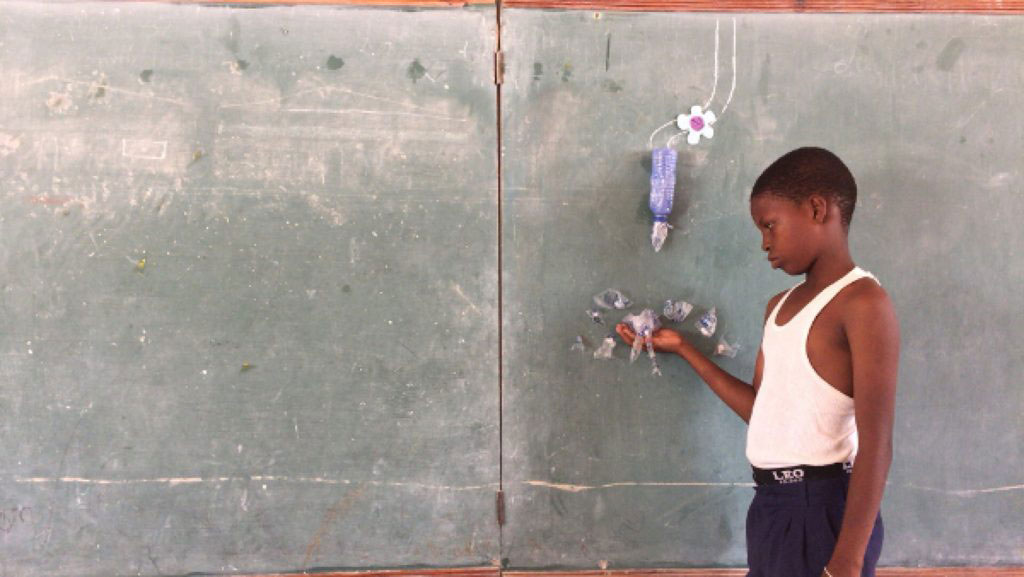
VJ.A. Bayona
Emilio Martí López
Haiti
Haitian Creole
2015
6 min.
Animated Short
This film is no longer available.
Adline enjoys playing soccer, but in place of a ball she uses a plastic bottle. In the aftermath of the 2010 earthquake in Haiti, soccer balls are just one of the resources no longer easily available. Despite her community’s displacement, Adline finds comfort at her school where the doors are always open.
Kari A.B. Chew
Jacob Manatowa-Bailey
Megan Lukaniec
Onowa McIvor
Mary Linn
Canada, United States
English
2020
5 min.
Animated Documentary Short
Often in language revitalization efforts, language acquisition is catered toward the youngest generation—excluding those who did not have the same educational resources growing up. This short calls to action both allies and Indigenous communities to be active members in this process of revitalization.
Clara Listya Dewi
Ngurah Yudha
BASAbali
Bali
Balinese
2020
4 min.
Animated Short
At first glance, Luh Ayu Manik Mas is an average Balinese eighth grader. But when environmental disaster strikes, she channels a powerful energy deep within herself to become a superhero capable of bringing harmony back to nature. Superhero Luh Ayu is the creation of BASAbali, a collaboration of linguists, anthropologists, artists, and community members of Bali with a shared goal of spreading awareness to the protection and sustainability of the Balinese language, environment and culture.
Marvels with Purpose: A Balinese Superhero Powered by Community (Folklife Magazine)
Kyle Baker
United States
Basque, English
2020
20 min.
Documentary Short
This film is no longer available.
In an effort to retain their language and culture, Basque immigrants in Bakersfield, California, have worked hard to sustain their language and pass down musical traditions through community efforts. However, approaches to cultural identity and tradition vary across generations.
Basque Diaspora in the United States (Smithsonian Folklife Festival)
Amado Villafaña Chaparro (Arahuaco)
Sebastian Gomez Ruiz
Colombia
Spanish, Iku (Arahuaco)
2017
16 min.
Documentary Short
This film is no longer available.
As the sun rises on an Arahuac village in northern Colombia, the villagers begin their day. Arhuaco filmmaker Amado Vilafaña Chaparro, the film’s co-director, shares his thoughts on anthropologists like Gerardo Reichel-Dolmatoff and Robert Gardner, and the (mis)representations they produce. Ultimately, he, and this film, affirm the power Indigenous people can seize by taking up the camera themselves— becoming authors of their image and authors of knowledge.
Georgianna Lepping, Jeremy Gwao, Regina Lepping, Zahiyd Namo, Junior Patrick Makau, Manner Le?vo, Neil Nuia, Daniel Kakadi, Edward Manuga
Solomon Islands
Solomon Island Pijin
2020
6 min.
Documentary Short
This film is no longer available.
Sacred lands around the world have faced severe destruction, seen the extinction of plants and animals, and felt the displacement of Indigenous peoples. All too aware of this dangerous fate, Indigenous communities of the Solomon Islands have worked to protect and prevent their sacred forests, Sky Aelans, from facing exploitation.
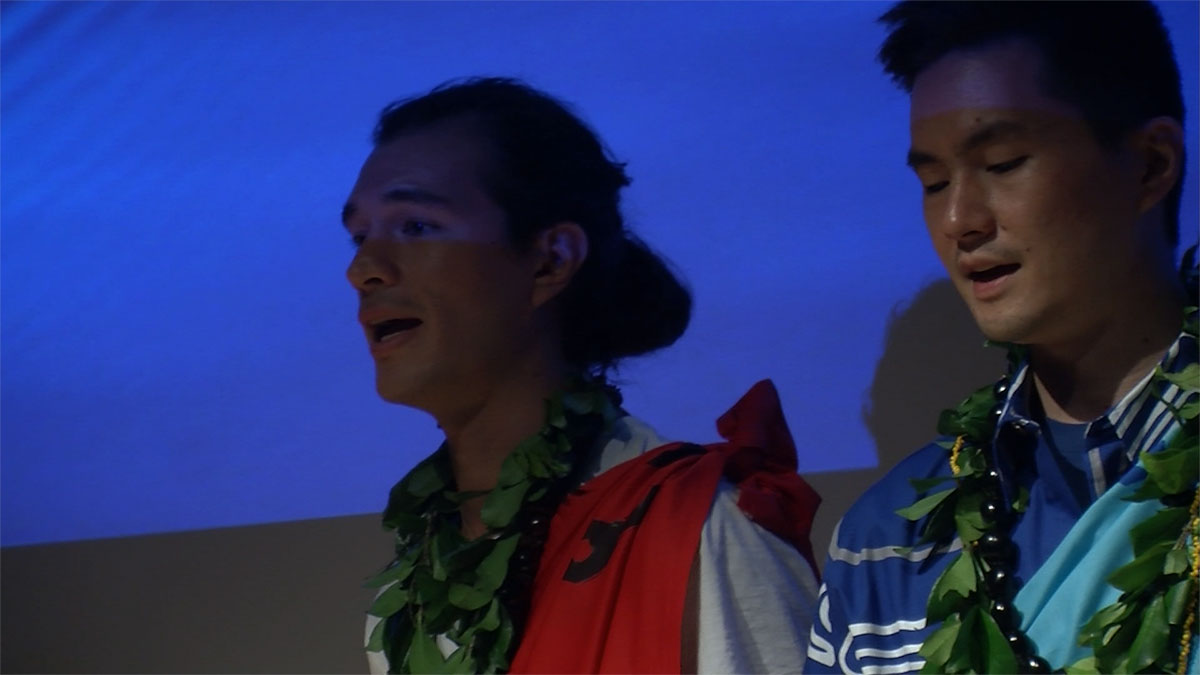
Jacqueline Hazen
Hawai‘i
Ōlelo Hawai‘i, English, Thakiwaki and Meskwaki Algonquian, Shinnecock
2017
24 min.
Documentary Short
This film is no longer available.
In the fall of 2015, Kris Kato, an emerging filmmaker, and Keoni DeFranco, the founder of a communications technology start-up, were initiated as kahu oli, caretakers of Hawaiian chant. Both young men live and work in New York City—but now, with the dual responsibilities to safeguard and share this Indigenous, familial tradition. This film highlights the voices of Kris, Keoni, and other members of the Hawaiian diaspora community who are integrating oli into the sounds of the island of Manhattan.
Hinaleimoana Wong-Kalu
Hawai‘i
Ōlelo Ni‘ihau Hawaiian
2020
8 min.
Animated Short
This film is no longer available.
Four spiritual beings of dual masculine and feminine energy traveled from Tahiti to Waikiki many years ago, bringing with them healing arts that blessed the people of Hawai‘i. Eternally grateful for their healing abilities, the people of Waikiki erected a monument to honor these incredible beings. Told in the ʻŌlelo Ni‘ihau Hawaiian language, Kapaemahu breathes life into a beautiful story that has been hidden from history for far too long.
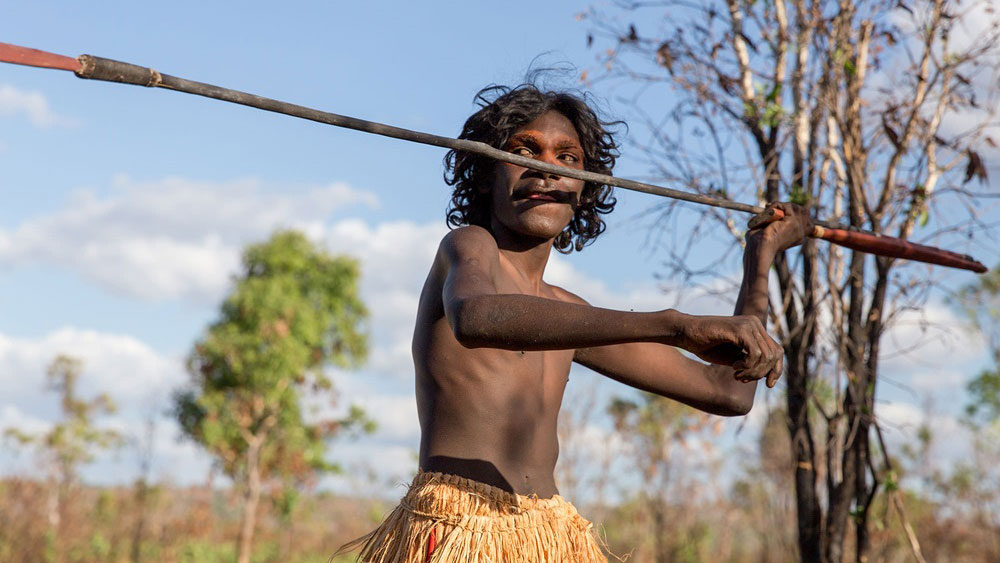
Terrah Guymala
Australia
Kunuwinjku
2017
14 min.
Narrative Short
This film is no longer available.
After accepting the responsibility of caring for several orphans, a selfish older woman denies them food and takes it for herself. Yet, as this ancestral story from Western Arnhemland reminds us, there are consequences to being greedy—the ramifications of which are playfully explored.
Chantelle Murray
Australia
Yugarabul, English
2018
14 min.
Narrative Short
This film is no longer available.
Mudju and her daughter Munna fall victim to the Australian government, whose mission is to separate Aboriginal children from their parents in order to assimilate them. After facing repeated violence in multiple forms, Mudju is forced to learn English in order to save her child from the Christian mission where she is being held captive.
Curtis Taylor
Nathan Mewett
Australia
Martu
2017
12 min.
Narrative Short
This film is no longer available.
Jarman is an Aboriginal man living in the western deserts of Australia with other members of the Martu community. Despite facing harsh difficulties and an abusive father, Jarman has taken on the role of protecting his younger disabled brother who he believes is protected by the spirit Mamu.
Welcome to the Smithsonian’s 2021 Mother Tongue Film Festival! The Opening Ceremony video includes remarks from the curators of the festival and the Secretary of the Smithsonian, Lonnie Bunch.
In this “talkback,” Kālewa Correa interviews filmmakers of Waikiki: director Christopher Kahunahana, producer Nicole Naone, and actor Danielle Zalopany, who plays Kea. Correa is one of the coordinators of the Mother Tongue Film Festival and the curator of Hawai‘i and the Pacific at the Smithsonian Asian Pacific American Center.
Waikiki is available to stream from February 21 to 27 in the United States. Viewership is limited to 400 people on a first-come, first-served basis. Register for free tickets.
In conversation with festival co-director Amalia Córdova, filmmaker Sophie Pinheiro discusses the process and inspiration behind her experimental documentary Teko Haxy/Being Imperfect, available February 21 to March 31.
Sophia is a filmmaker, teacher and anthropologist. She recently completed the postgraduate program in film and audiovisual media at the Universidade Federal Fluminense in Rio de Janeiro. She has won awards for her visual and film works, which have been exhibited across Brazil and abroad. Her first mid-length film TEKO HAXY/Being Imperfect was co-directed with filmmaker Patrícia Ferreira, one of the most engaged women among Brazil’s Indigenous filmmakers.
Women are often entrusted with cultural and language transmission, and we highlight this responsibility by bringing together women directors on a roundtable each year. Join us for a conversation with Becs Arahanga (Hinekura), Valeriya Golovina (Our Love), and Sophia Pinheiro and Patrícia Ferreira (Being Imperfect), moderated by festival co-director Amalia Córdova and curator and filmmaker Cass Gardiner.
Live real-time captioning (CART) and American Sign Language (ASL) interpretation will be provided for this program while it is live. To access, please follow the links below.
Simulcast with ASL and Captions: s.si.edu/folklifeASL
Live Captions only via Streamtext: s.si.edu/folklifeCART
This event is co-presented with Columbia University School of the Arts.
Accompanying the film Tote/Grandfather, writer and director Marίa Sojob join Mother Tongue co-director Amalia Córdova and Emmy Award-winning filmmaker Sebastián Díaz in conversation. The discussion is introduced by Ron Gregg of Columbia University’s Film and Media Studies department.
Join us for a roundtable discussion exploring the thirty-year collaboration between anthropologists and filmmakers Lina Fruzzetti (Brown University) and Ákos Östör (Wesleyan University), spanning numerous publications and six films. Moderated by Alice Apley (director, Documentary Education Resources) and joined by Pam Wintle (senior film archivist, Human Studies Film Archive), this roundtable will focus on Fruzzetti and Östör’s important body of work, and the trajectory and craft of their filmmaking and storytelling as anthropologists.
This event is co-sponsored by the Taiwan Academy, the Taiwan Ministry of Culture, and the Smithsonian’s National Museum of Asian Art
In conversation with National Museum of Asian Art film curator Tom Vick, filmmaker Su Hung-En will discuss his documentary The Mountain, available March 22 to April 4. Learn about the history of Taiwan’s Indigenous peoples’ recertification movement in this Q&A, focusing on creativity and cultural perseverance under the challenges of forced assimilation.
Language reclamation, pressures on language from current and historical dislocation and forced relocations, and filmmaking for educational purposes are some of the through lines that will be explored in our education roundtable. Smithsonian curator Mary Linn will moderate the live discussion with Ruben Reyes, director of Garifuna in Peril; Kari Chew (Chickasaw), the project lead for Growing the Fire Within; and Putu Desy Apriliani, manager of the “scholars’ room” bookshelf in BASAbali, the organization involved with the development of Luh Ayu Manik Mas.
Soori, Hakim, Akbar, and Mohammed have a collective dream: to travel from Iran to their parents’ homeland of Afghanistan and play their first rock concert. Discussing their feature-length film The Forbidden Strings, director Hasan Noori and producer Afsaneh Salari explore the intricacies of production with the National Museum of Asian Art film curator, Tom Vick.
In Haka Puai Te Kainga / Eating Up Easter, director Sergio Rapu speaks to the pressures the people of Rapa Nui (Easter Island) feel amid increased tourism and development. Rapu, alongside Smithsonian Asian Pacific American Center curator Kālewa Correa, discusses the power of environmental storytelling explored in the film.
A portrait of resilience, The Land of Eb encapsulates the barriers experienced by Marshallese communities displaced by nuclear weapon testing that has forever altered the islands they call home. Join us for an engaging conversation with the film’s director, Andrew Williamson, and lead actor Jonithen Jackson, moderated by festival co-director Joshua Bell.
After being initiated as kahu oli, caretakers of Hawaiian chant, filmmakers Kris Kato and Keoni DeFranco recognized their responsibility to uphold their traditions while far from home in New York City. In conversation with Kris, Keoni, and the film’s director, Jacueline Hazen, festival co-director Joshua Bell will discuss the importance of holding space for our own cultural practices across geographical boundaries.
Exploring our 2021 theme, the healing power of storytelling, this panel highlights the unique ability of film to project stories to places they might have never traveled before—bringing connection, understanding, and healing. Moderated by festival co-director Joshua Bell and Smithsonian Asian Pacific American Center curator Kālewa Correa, directors Christopher Auchter (The Mountain of Sgaana), Adrian Baker (Source of the Wound), Christopher Kahunahana (Waikiki), and Hinaleimoana Wong-Kalu (Kapaemahu) will discuss the role of storytelling in their films.
Live real-time captioning (CART) and American Sign Language interpretation will be provided for this program while it is live. To access, follow the links below.
Simulcast with ASL and captions via Zoom: s.si.edu/folklifeASL
Live captions only via Streamtext: s.si.edu/folklifeCART